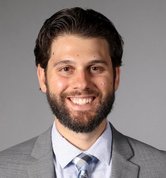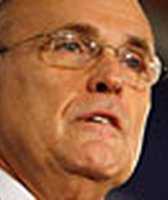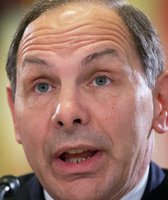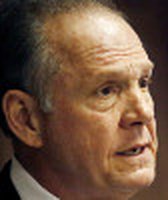Stand up for the facts!
Our only agenda is to publish the truth so you can be an informed participant in democracy.
We need your help.
I would like to contribute
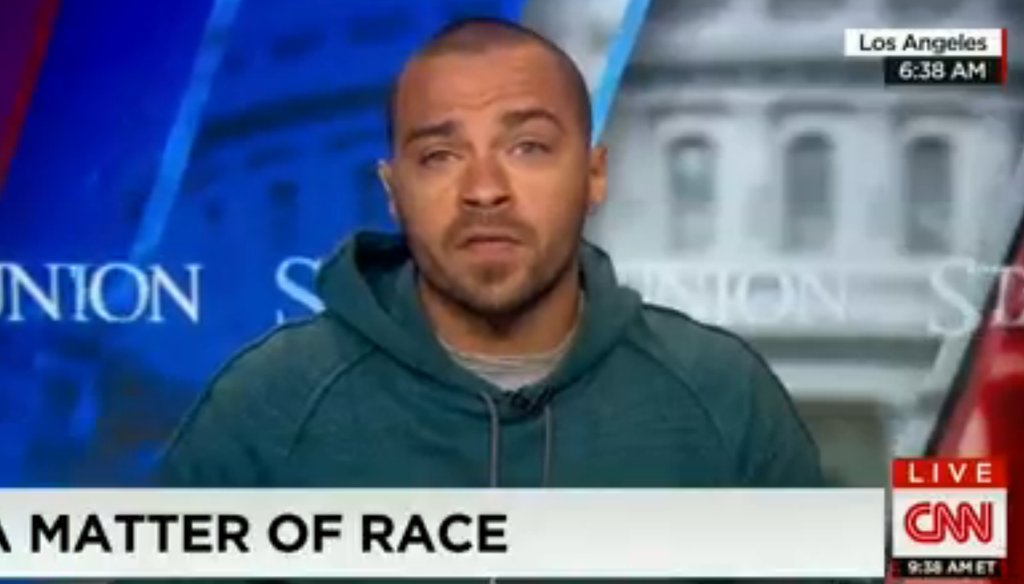
Actor Jesse Williams on CNN's "State of the Union" on Aug. 17, 2014.
With competing narratives, widespread misinformation and multiple police departments conducting investigations, there’s more questions than answers a week after a Ferguson, Mo., police officer shot and killed an unarmed black teen Aug. 9.
How this confusing tragedy and the subsequent outcry from the local community have played out in the national media was debated Sunday on CNN’s State of the Union.
Actor and civil rights activist Jesse Williams, best known for his role as a doctor on Grey’s Anatomy, emphasized that journalists should not sensationalize findings that don’t answer questions about why 18-year-old Michael Brown was shot by police -- like a security video Ferguson authorities released of Brown allegedly robbing a convenience store minutes before he was killed.
"You will find that the people doing the oppressing often want to start the narrative at a convenient point, always want to start the point in the middle," said Williams, who is on the board of directors for the Advancement Project, a civil rights group. "This started with a kid getting shot and killed and left in the street for four hours. I've never seen a white body left in the street for four hours in the sweltering heat. I've never - you know, the cop doesn't call - doesn't call in the shooting. The body isn't put in an ambulance. It's (put) in some shady unmarked SUV."
There’s a lot to take in there. Specifically, we wondered if the police officer who shot Brown, identified Friday as Darren Wilson, called in the incident? We found the answer was not as definitive as Williams makes it seem.
Ultimately, we don’t know enough to put Williams’ claim on the Truth-O-Meter. But we can lay out the details that have emerged so far.
We tried to contact Williams through social media and the Advancement Project. While he could not be reached, Jennifer Farmer, spokeswoman for the Advancement Project, said, "I think he meant that the handling of this killing was unusual and insensitive to the community generally."
We also contacted Ferguson Police Department spokesman Tim Zoll, who criticized Williams’ characterization of the incident, though he did not provide any details that would specifically contradict Williams’ claim.
"I don't believe Mr. Williams was there at the time so his comments are based strictly on his imagination," Zoll said. "I wasn't even there so I can't comment accurately."
Zoll then referred us to the St. Louis County Police Department, which has taken over the investigation. A spokesman there did not respond to our inquiry.
Where does the notion that Wilson did not call in the shooting emerge from? There appear to be two sources.
One is the lawyer for Dorian Johnson, who was with Brown at the moment of the confrontation with police and fled the scene unharmed. According to the Washington Post, Johnson’s attorney, former St. Louis mayor Freeman Bosley Jr., said Saturday that the Ferguson police officer "doesn’t attempt to resuscitate. He does not call for medical help. The officer didn’t call it in that someone had been shot."
Additionally, the hactivist group known as Anonymous released audio from the St. Louis County dispatch from the afternoon of Brown’s death. According to the Post, the authenticity of the recordings has been confirmed.
In the recordings, a dispatcher said Ferguson police asked for help to assist with crowd control in the area of the shooting and asked for permission to send an officer.
Moments later, the dispatcher said she hears an officer is involved in a shooting, but the information is coming from local media.
"We just got another call stating that an officer’s out shooting at (the intersection of) Canfield and Coppercreek. I don’t who called it in, it was called into my desk," the dispatcher said. "Be advised this came from the news."
She adds: "We’re just getting information from the news, and we just called Ferguson back again and they don’t know anything about it."
While more information is needed to explain why the Ferguson police department told St. Louis county "they don’t know anything about it," it doesn’t necessarily mean that Wilson did not call in the shooting.
In fact, incident reports released by Ferguson police indicate a swift response.
A timeline produced by St. Louis Public Radio based on police reports breaks down police action Aug. 9, including the convenience store robbery and the shooting.
-
12:00:07 p.m., Wilson left a scene where he was assisting with a "sick call."
-
12:01:50 p.m., a shooting event is opened by the Ferguson police department.
-
12:02:22 p.m., Ferguson dispatch alerts another officer, who is en route and arrives on scene.
-
12:04:55 p.m. EMS is contacted.
According to a timeline published by USA Today, at 12:04 p.m. a "second officer arrives on the scene followed by a supervisor one minute later. An ambulance responding to the earlier sick person call drives by and responds to assess Brown."
None of this makes clear who made the initial call to police. It’s possible dispatch sent an officer based on a report of a shooting from a witness, or that the officer may have been nearby and responded independently. However, whether it was Wilson who made the call, it does appear that police units arrived quickly on the scene.
In summation, we don’t know what happened in the minutes after Wilson shot Brown -- and that includes Williams. Conflicting accounts from witnesses and the police and frustratingly fragmented responses from the various authorities involved have produced few answers eight days later, even to simple questions like, Did Officer Darren Wilson call in the shooting of Michael Brown?
Our Sources
CNN State of the Union, Transcript for Aug. 17, 2014
Email interview with Tim Zoll, spokesman for Ferguson, Mo., Police Department, Aug. 17, 2014
Email with Jennifer Farmer, spokeswoman for the Advancement Project, Aug. 17, 2014
Washington Post, "In Ferguson, three minutes — and two lives forever changed," Aug. 16, 2014
Washington Post, "Even before Michael Brown’s slaying in Ferguson, racial questions hung over police," Aug. 13, 2014
Washington Post, "This is what Ferguson police say occurred in the minutes leading up to Michael Brown’s death," Aug. 15, 2014
St. Louis Public Radio, "Ferguson shooting timeline," Aug. 15, 2014
USA Today, "Timeline: Michael Brown shooting in Ferguson, Mo.," Aug. 14, 2014
YouTube, Anonymous Audio Tapes St Louis Dispatch, accessed Aug. 17, 2014
YouTube, Mike Brown shooting, Ferguson Missouri, accessed Aug. 17, 2014
